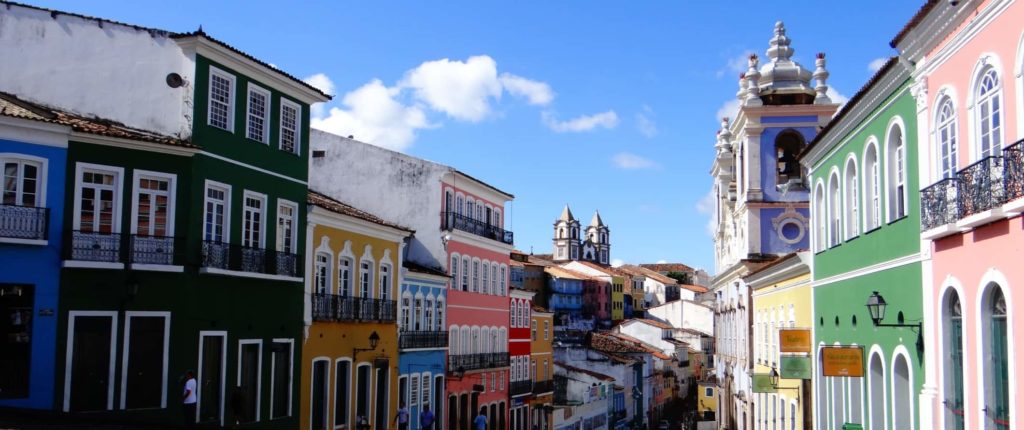Accommodation – Brazil is a huge country (it’s the 7th-largest in the world) and accommodation prices fluctuate from city to city and from season to season (with huge increases during Carnival). Prices in places like Rio de Janeiro and Salvador are pretty consistent, but for beachy destinations like Florianópolis, prices change dramatically depending on the time of year.
A 4–6 person dorm costs about 75–85 BRL per night, while a bed in a 8–10 person dorm costs 60–70 BRL. More remote places like Fernando de Noronha have higher prices, with dorms costing up to 150 BRL per night.
A private double room in a hostel costs about 225–300 BRL, but sometimes you can find rooms for as low as 150 BRL per night.
A budget two-star hotel room in the center of town costs 200–300 BRL per night with air-conditioning and breakfast included. If you’re willing to leave the city center, you can sometimes find rooms for as low as 150 BRL per night.
Airbnb is another great budget option, with private rooms averaging around 100–150 BRL per night, while entire apartments or homes start around 275 BRL.
Campgrounds are plentiful by the beaches and national parks. Expect to pay around 40–70 BRL per night for a basic plot. Amenities generally include free Wi-Fi, bathroom facilities including hot showers, and charging stations.
Food – Brazilian cuisine — like the country itself — is a mix of many cultures, with European, Amerindian, African, and Japanese influences. As such a large country, food varies per region, with seafood plentiful on the coastlines and Brazilian barbeque dominating in the south. Rice and beans are a staple no matter where you are.
Common vegetables include tubers like cassava and yams, tomatoes, red peppers, okra, and more. Being a subtropical country, there’s a huge variety of fruits, with the most famous being the superfood açaí, though cupuaçu, mango, papaya, guava, orange, passion fruit, and pineapple are all common as well.
Feijoada, Brazil’s national dish, is a meaty bean stew that is traditionally eaten for Wednesday or Saturday lunch. Other popular dishes include moqueca (fish stew), polenta, and vatapá (a stew of bread, shrimp, coconut milk, and peanuts) among countless others.
Some popular street food snacks include pão de queijo (cheese bread rolls), acarajé (black eyed pea and shrimp fritters), coxinha (chicken croquettes), and pastéis (savory fried pies with assorted fillings).
All of this is to say that Brazil has such a variety of food and flavors that you never have to go far to find an affordable meal.
Street food like pastel (a deep-fried pastry with filling) or coxinha costs around 8–10 BRL. An açaí (served pureed and frozen, with toppings you can choose from) from a street stand or takeaway spot is 15–20 BRL. A sandwich and drink at a juice bar should be no more than 35–40 BRL, while a combo meal at a fast-food restaurant (think McDonald’s) is around 30–35 BRL. A meal at a Chinese takeout restaurant costs about the same, at 35 BRL for a dish like fried rice. Burgers cost 25–30 BRL and pizzas are around 50–60 BRL.
Buffets, where you pay by weight, are very common throughout Brazil. You usually pay around 65–80 BRL per kilo.
A meal at an inexpensive restaurant serving typical Brazilian dishes costs about 20–40 BRL, depending on the region and city. A meal with two courses at a casual restaurant starts from 60 BRL, though prices at restaurants along the beach can go much higher, often starting at 80 BRL for a dish.
If you want to splash out, a three-course meal at a mid-range restaurant costs about 150–180 BRL, but you can expect to pay nearly double this price at some places in Rio de Janeiro or São Paulo.
Dishes at higher-end seafood restaurants cost 150–225 BRL and up. At many restaurants in coastal areas, seafood dishes and platters are meant for two (often served with an entire fish) – it’s a huge portion of food that could easily be split between three people.
A domestic beer costs about 10–15 BRL, while a cocktail is 15–25 BRL. Wine is expensive (and not very good) in Brazil, so expect to pay at least 15–20 BRL per glass. A soda or juice is 5–8 BRL, and a cappuccino is 9–11 BRL.
Grocery shopping costs about 100–200 BRL per week for basic staples like fresh veggies, pasta, rice, and some meat or fish.
Activities – Admission to see the famous Iguazú Falls is 72 BRL while tickets to see a soccer game can be as low as 20 BRL. Tickets to popular attractions (like Sugarloaf Mountain or Christ the Redeemer in Rio) are 150 BRL. Multi-day wildlife tours cost around 1,325 BRL per day, while samba classes cost around 105 BRL. Capoeira classes are around 70 BRL. Museum admission is usually around 10–30 BRL.
- Dagestan: between the grandeur of nature and the challenges of tourism
- Kahovka
- Chechnya
- Archaeological expedition of the Hermitage discovered a unique artifact of the Stone Age at excavations in the Serteyskaya Valley
- Cuba
- Chile
- With a Movie Camera in Kamchatka
- And in Africa the mountains are this high
- Sierra Leone
- Kenya Nchi Yangu Song
- Istanbulkart Scams: What Tourists Should Watch Out For
- Lofoten Islands
- Endemics of Baikal
- Sydney
- Forest Elephants May Return to Nyungwe National Park
- Pirate treasure hunting around the world: where to look without breaking the law
- Bosnia and Herzegovina
- Win a four-night Greek getaway for two in one of the most stylish resorts in the Aegean courtesy of Sani Resort
- Belgium
- Unadsdalur Church











